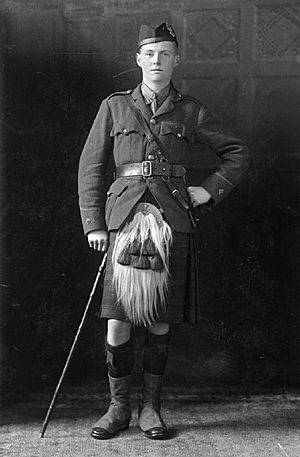Francis Douglas, 11th Marquess of Queensberry facts for kids
Quick facts for kids
The Most Honourable
The Marquess of Queensberry
|
|
|---|---|

Lord Queensberry, then Viscount Drumlanrig, during the First World War
|
|
| Scottish representative peer in the House of Lords |
|
| In office 16 November 1922 – 10 May 1929 |
|
| Personal details | |
| Born | 17 January 1896 Kingston upon Thames, Surrey |
| Died | 27 April 1954 (aged 58) Folkestone, Kent |
| Spouses |
|
| Children |
|
| Parents |
|
| Alma mater | Royal Military Academy Sandhurst |
| Awards | |
| Military service | |
| Allegiance | |
| Branch/service | |
| Years of service | 1915-1919 (active), 1920-1927 (Territorial and Army Volunteer Reserve) |
| Rank | Captain |
| Unit | Royal Highlanders |
| Conflict | World War I |
Francis Archibald Kelhead Douglas (born January 17, 1896, died April 27, 1954) was a Scottish soldier, stockbroker, and writer. He was also known as the 11th Marquess of Queensberry. Before he became Marquess, people called him The Honourable Francis Douglas and later Viscount Drumlanrig.
Contents
Life and Career
Early Life and Military Service
Francis Douglas was born in Kingston upon Thames, England. His father was Percy Sholto Douglas, the 10th Marquess of Queensberry. Francis went to Harrow School and then to the Royal Military College, Sandhurst, which is a famous army training school.
In January 1915, Francis joined the 2nd Battalion of the Black Watch (Royal Highlanders) as a second lieutenant. He fought in World War I on the Western Front. He was promoted to lieutenant in October 1915 and then to captain in November 1917. During the war, he faced several health challenges. He was also shot in the leg. In November 1919, he left the army because of his injuries.
After the War
After World War I, Francis became a stockbroker. He mainly dealt with shares from gold and diamond mines in South Africa. He was a member of the London Stock Exchange.
When his father passed away in 1920, Francis became the Marquess of Queensberry. From 1922 to 1929, he served as a Scottish representative peer in the House of Lords. This meant he was one of the people who represented Scotland in the British Parliament. In 1927, he officially resigned from the army reserve.
Helping Others During World War II
In 1938, Lord Queensberry worked to create a sports and recreation club in Earls Court, London. He wanted to offer working people a place to enjoy activities, similar to what wealthier people had. However, when World War II started in 1939, his plans changed.
The Prince Edward Theatre had been closed since 1940 because of bombings (known as the Blitz). In 1942, it reopened as the Queensberry All-Services Club. This club was a place where soldiers, sailors, and air force members could relax. They could dance, play table tennis, billiards, and chess, or watch variety shows. Lord Queensberry himself helped out at the club, working as a receptionist and waiter.
As an Author
Lord Queensberry also wrote two books about his family's history. These were The Sporting Queensberrys (published in 1942) and Oscar Wilde and the Black Douglas (published in 1949), which he wrote with Percy Colson. His family had a connection to the famous writer Oscar Wilde through his grandfather.
Family Life
Lord Queensberry was married three times.
His first wife was Irene Clarice Richards (1899-1977). They married on December 4, 1917. They had one daughter:
- Lady Patricia Sybil, born December 24, 1918.
His second wife was the painter Cathleen Sabine Mann. They married on March 18, 1926. They had two children:
- Lady Jane Katherine, born December 18, 1926.
- David Douglas, 12th Marquess of Queensberry, born December 19, 1929.
His third wife was Muriel Beatrice Margaret Chunn, also known as "Mimi." They married in 1947. They had one son:
- Lord Gawain Archibald Francis Douglas, born May 23, 1948.
Lord Queensberry passed away in 1954 at the age of 58. His eldest son, David, became the 12th Marquess of Queensberry.

